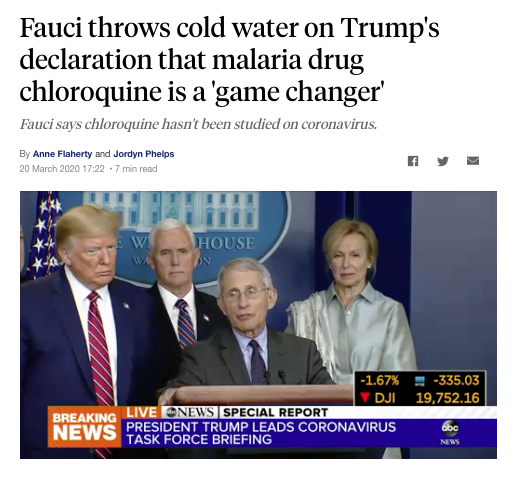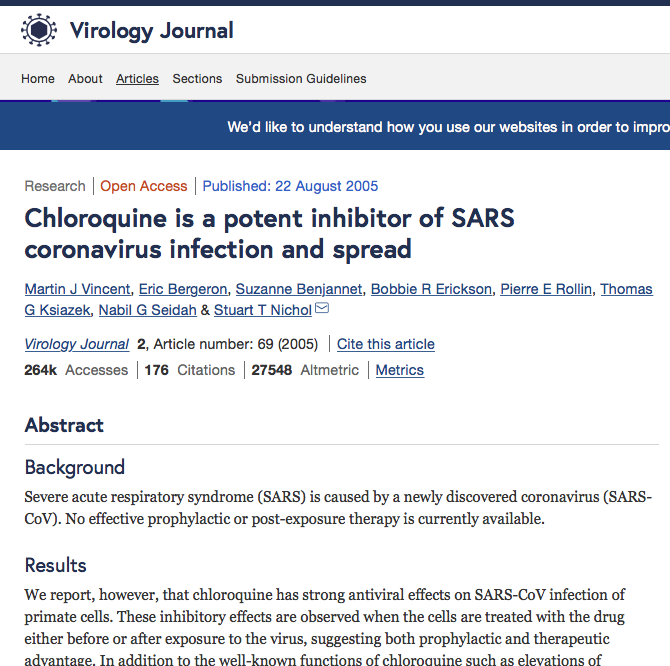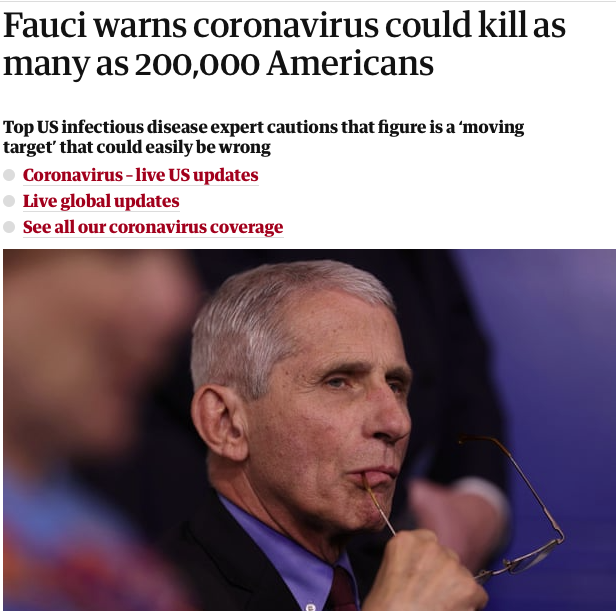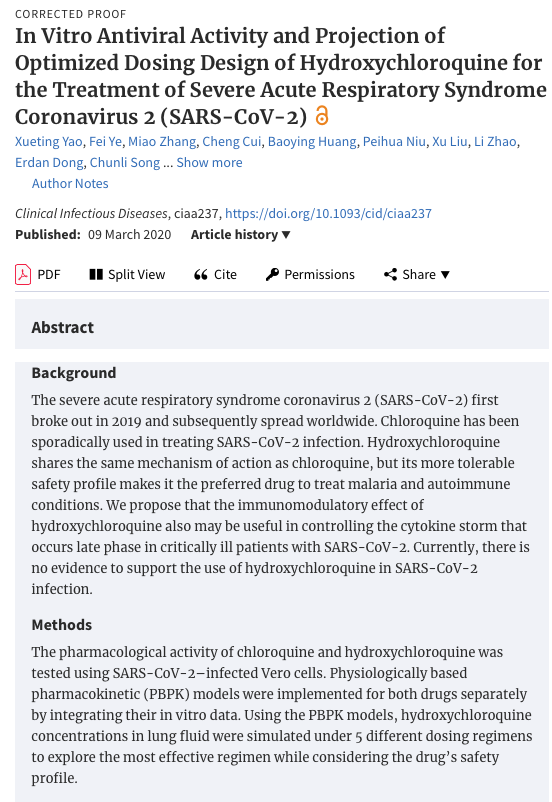According to Dr. Anthony Fauci the Reopening of the US Economy Would Endanger People’s Heath
15 Years Ago Chloroquine Was Recommended by the CDC as "A potent inhibitor of SARS Coronavirus". Why is Fauci Blocking It?

Anthony Fauci, director of the IHSS is playing a “blame game”.
He wants the lockdown to continue, no reopening of the US economy because that would endanger people’s health.
Dr. Fauci intimates that hydroxychloroquine and chloroquine are dangerous. The evidence is anecdotical, says Fauci. The corporate media presents it as a untested drug.
“The only tool we have right now for fighting the coronavirus is social distancing” says Dr. Fauci. And of course confinement, “stay at home”. Neither of these “recommendations” are medical solutions, i.e. drugs which can be used to prevent and inhibit the infection.
Fauci is opposed to the treatment of COVID-19 using chloroquine. What he wants is for all of us to be vaccinated.
According to CNN, Trump is to blame:
Trump has been pressing federal health officials to make the drugs — hydroxychloroquine and chloroquine — more widely available, despite little reliable evidence that they are effective at treating the virus. (emphasis added)
“Fauci says chloroquine has not been studied on coronavirus”.
What Fauci fails to mention is that Chloroquine was “studied” and tested fifteen years ago by the CDC as a drug to be used against coronavirus infections.
According to the NYT,
The federal agency led by Dr. Anthony Fauci issued guidelines on [April 21] that stated there is no proven drug for treating coronavirus patients” (emphasis added)
The report echoed what frustrated doctors already know: Not enough is known about the highly infectious virus or how to combat it.
“No proven drug”: “Not Enough Known”. Nonsensical and irresponsible statements.
Chloroquine was used in 2002 and tested against SARS-1 coronavirus in a study under the auspices of the CDC published in the Virology Journal.
An August 2005 report in the peer reviewed Virology Journal (summary below) was published in 2005.
The main conclusion of the article was that: Chloroquine is a potent inhibitor of SARS coronavirus infection and spread. It was used in the SARS-1 outbreak in 2002. It had the endorsement of the CDC.
***
Martin J Vincent, Eric Bergeron, Suzanne Benjannet, Bobbie R Erickson,
Pierre E Rollin, Thomas G Ksiazek,Nabil G Seidah & Stuart T Nichol
Virology Journal volume 2, Article number: 69 (2005)
Scroll down for excerpts of the article in the Virology Journal published by BioMed Central. Access to the complete article.
The main author Dr. Martin J. Vincent together with several of his colleagues were affiliated with the Special Pathogens Branch of the Atlanta based CDC together with co-authors from a Montreal based partner research institution. The main conclusions of this study are that Chloroquine is a tested drug and can be used for SARS-corona virus infections:
“Preinfection chloroquine treatment renders Vero E6 cells refractory to SARS-CoV infection”
“Postinfection chloroquine treatment is effective in preventing the spread of SARS-CoV infection”
The drug was rapidly pushed to clinical testing as an experimental treatment in China; on Feb 15, 2020, it was included in the sixth version of the COVID-19 treatment guidelines by the National Health Commission of the People’s Republic of China. This guideline established the use of chloroquine nationwide for patients with COVID-19, at a recommended adult dose of 500 mg twice per day for no more than 10 days. 1
.
According to the WHO, “The most commonly reported symptoms [COV-19] included fever, dry cough, and shortness of breath, and most patients (80%) experienced mild illness.”
.
Dr. Fauci broadly acknowledges and explains the WHO definition of COVID in his peer reviewed NEJM article. His media hype statements however are “misleading”.
And Here is the Hype of Dr. Fauci:
The Hill
The Vaccine
Dr. Fauci is currently pushing for the development of a multibillion dollar vaccine on behalf of Big Pharma and the Gates Foundation. He is in conflict of interest. And that vaccine is far more dangerous than chloroquine.
***
ANNEX
For further details on the current SARS-2 coronavirus (alias COVID-19) as well as its relationship to SARS-1 coronavirus, see the peer reviewed article by Anthony Fauci and co-authors Clifford Lane and CDC Director Robert Redfield published in March issue of The New England Journal of Medicine
Excerpt from the VJ article entitled
Chloroquine is A potent inhibitor of SARS Coronavirus Infection and Spread
Martin J Vincent, Eric Bergeron, Suzanne Benjannet, Bobbie R Erickson, Pierre E Rollin, Thomas G Ksiazek,Nabil G Seidah & Stuart T Nichol
Virology Journal volume 2, Article number: 69 (2005)
Results
We report, however, that chloroquine has strong antiviral effects on SARS-CoV infection of primate cells. These inhibitory effects are observed when the cells are treated with the drug either before or after exposure to the virus, suggesting both prophylactic and therapeutic advantage. In addition to the well-known functions of chloroquine such as elevations of endosomal pH, the drug appears to interfere with terminal glycosylation of the cellular receptor, angiotensin-converting enzyme 2. This may negatively influence the virus-receptor binding and abrogate the infection, with further ramifications by the elevation of vesicular pH, resulting in the inhibition of infection and spread of SARS CoV at clinically admissible concentrations.
Conclusion
Chloroquine is effective in preventing the spread of SARS CoV in cell culture. Favorable inhibition of virus spread was observed when the cells were either treated with chloroquine prior to or after SARS CoV infection. In addition, the indirect immunofluorescence assay described herein represents a simple and rapid method for screening SARS-CoV antiviral compounds.
Read more here (complete article)
Reviews
M Wang, R Cao, L Zhang, X Yang, J Liu, M Xu, Z Shi… – Cell research, 2020 – nature.com
In December 2019, a novel pneumonia caused by a previously unknown pathogen emerged
in Wuhan, a city of 11 million people in central China. The initial cases were linked to
exposures in a seafood market in Wuhan. 1 As of January 27, 2020, the Chinese authorities …
X Yao, F Ye, M Zhang, C Cui, B Huang… – Clinical Infectious …, 2020 – academic.oup.com
Background The severe acute respiratory syndrome coronavirus 2 (SARS-CoV-2) first broke
out in 2019 and subsequently spread worldwide. Chloroquine has been sporadically used
in treating SARS-CoV-2 infection. Hydroxychloroquine shares the same mechanism of …






